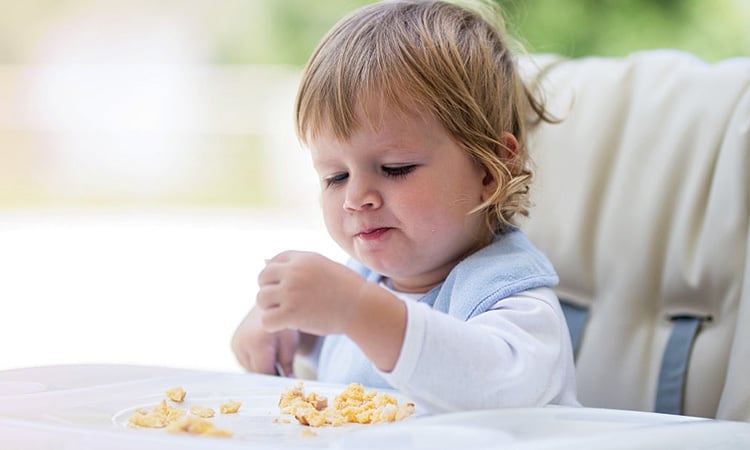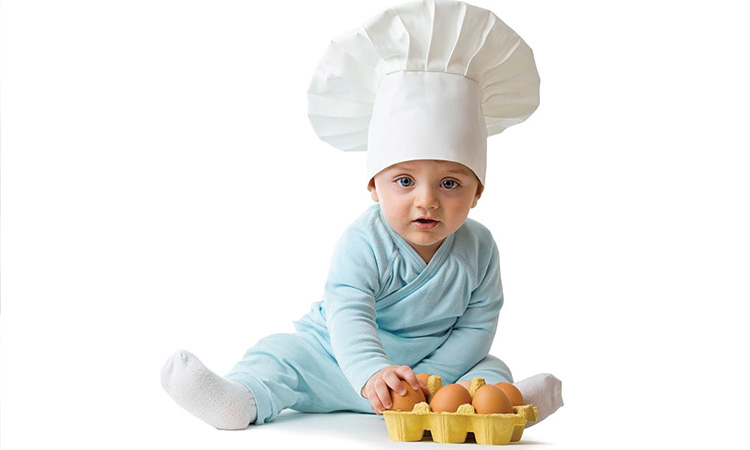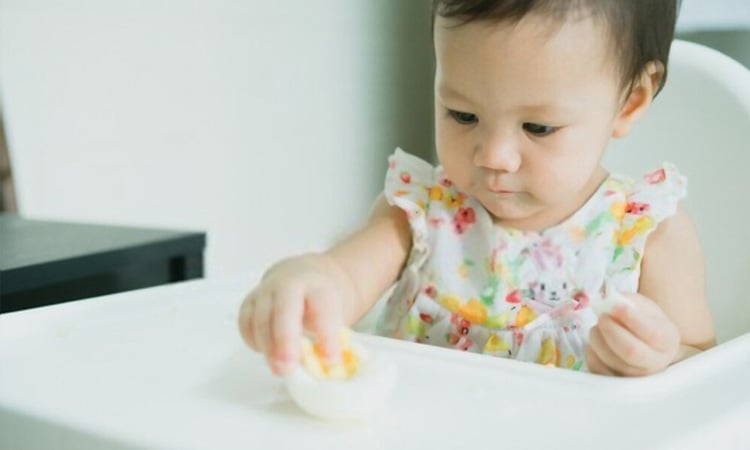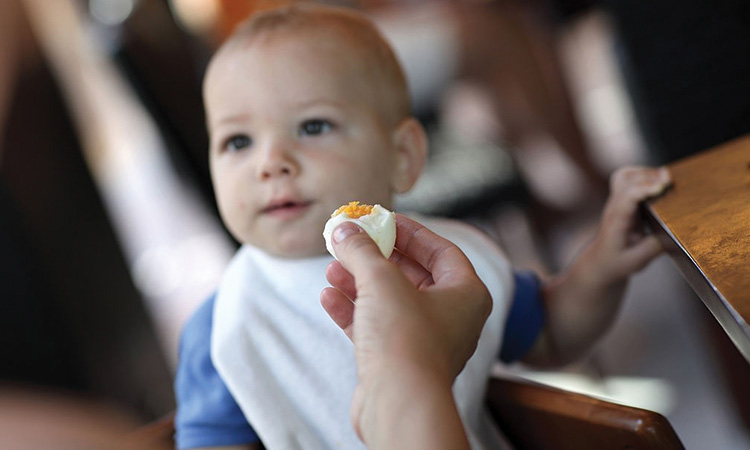Inexpensive, versatile and loaded with proteins, eggs are probably one of the few foods that can satiate hunger without taking much time to cook. So are you wondering when and how to give eggs to your baby? What is the appropriate age of introducing eggs to baby? And how to go about it. Lets try to answer your queries in this article.
It is well-known that these eggs are consumed by humans for eons to procure protein for bodybuilding, health gain, and many other nutritional benefits. The most widely consumed eggs are chicken eggs, which are wealthy in albumin, protein, and choline.
Let’s know everything on eggs and babies.
Eggs- Nutritional Value
It’s not that hard to find an egg. You’ll easily get in all the grocery shops and poultry farming stocks at an affordable price. In addition to health benefits, the greatest advantage of using eggs is that they are easy to cook as they don’t involve complex recipes like that of other items. Also, they can be included in your dishes in a variety of ways.
70 calories and 6 grams of protein are incorporated into the overall egg. Particularly, the egg yolk is of the great nutritional value as it consists of 250 milligrams of choline.
The function of the choline is to promote the normal functioning of the cells and tissues. Also, choline assists in ensuring the liver’s proper functioning and transduction of oxygen and nutrients to every part of the body.
In general, the overall egg contains an abundant amount of vitamin B, folate and Riboflavin, and minerals like selenium and phosphorus.
When Can A Baby Have Eggs?
Now that you know the rich essence of eggs for babies and if you want your baby to acquire all these plus factors, you must start giving your baby eggs. But before that, consult with your pediatrician.
Studies have revealed that babies can initiate the intake of eggs once they reach 6 months. Infact, early introduction of eggs to babies has been linked to better growth. Babies tend to adapt to eggs early on because it is around this age that they start to feed on food items other than formula/breast milk.
Related Reading: Age Wise Home Remedies For Loose Motions In Babies
Some parents wait for their child to turn an year old before introducing eggs. That is because eggs can be allergenic to some infants. However, the basic rule of thumb is to wait for 3 days after you introduce anything new to your baby. If your baby shows any adverse reaction- it is recommended that you have a word with your doctor.
Top allergies in babies when you introduce eggs for babies

In some cases, 6- or 9-months babies can be introduced with only the egg yolk, which is devoid of proteins causing allergic symptoms.
Still, the white portion may consist of proteins responsible for causing allergic reactions in the baby’s body. Just boil an egg, peel off the eggshell and smash the yolk or vitellus; the pieces can be picked up by your baby himself/ herself, or else you can spoon-feed him/her.
However, if the allergic symptoms have resided in your heredity, or if your baby exhibits any allergic reactions towards any food, then your pediatrician may recommend you to hold its use until your child completes 24 months.
The immune system is not well matured in infants’ case, and some baby’s immunity might not be well developed because they may produce allergies when exposed to the eggs, more specifically, the albumen portion.
Allergic reactions impose negative impacts on your derma, respiratory system, digestion process, and cardiovascular system. The symptoms involve-
- eczema
- dermatitis
- nausea
- diarrhea
- vomiting
- difficulty breathing
- rapid heartbeat
- aches
The symptoms may become severe if your child’s immune system is attenuated or many eggs are consumed. In seldom cases, the baby may experience a serious life-threatening allergic reaction, known as anaphylaxis. It occurs within seconds or minutes of exposure to an allergen. Anaphylaxis leads to breathing difficulty and low blood pressure, which warrants for immediate medical attention.
How Should You Start Introducing Eggs To Babies?
Before introducing eggs to your baby, you should at first start familiarizing your baby with different high-protein foods other than eggs at 6 or 7 months. If your baby has had rice or any other cereal and has had fruit purees without any adverse effect, you can introduce eggs to your baby gradually.
The best way to incorporate new foods to your baby is to annex them gradually and habituate with one at a time. In this way, you can observe any unintended impacts or reactions and analyze which food is the root cause of such potential allergies.
Related Reading: 13 Health Problems That May Affect Premature Babies
The easiest and reliable way to introduce eggs is to adopt a 3r-day wait technique. On the first day, introduce the eggs to your baby and wait for 3r days prior to the annexation of new items on their diet. If you notice any forms of allergic symptoms or sensitiveness within these days, then immediately catch up with your baby’s pediatrician.
Some top ways to introduce eggs to babies

However, to prevent allergic reactions, you can at first introduce egg yolk prior to egg white as the yolk is less allergenic than the white portion. Here are simple ways to do so –
- Peel off the albumen and extract the yolk from a hard-boiled egg. Smash the yolk, and you can add breast milk or formula milk preferentially and mix the whole properly. Then it’s ready to be served as egg yolk puree to your baby.
- The other way to give egg yolk to baby is to present it in the form of an egg yolk omelet. All you have to do is to segregate the yolk from a raw egg and stir it well. Simultaneously, you can add some oil to the pan and heat it. Then, spread the stirred egg yolk on the pan and cook from both sides until golden brown. Then, chop the whole into minute pieces to aid comfort to your baby while eating.
- Once a baby becomes familiar with the yolk, you can give it a shot to try it with other pureed vegetables and fruits. This could probably help you to prepare lavish egg soups with vegetables.
- You can also try the yolk with other cereals, grains, and food items to make recipes such as egg and oats pancake, egg rice, etc.
Now, as the baby turns one year, you can try out more egg recipes with proper consultation with your baby’s pediatrician. But make sure that your child isn’t taking raw or partially cooked eggs or any homemade items containing these, such as homemade ice-cream or mayonnaise.
Recipes to introduce eggs for babies
To familiarize your infant with more egg whites, you can try out the following items in accordance with your baby’s preference.
1. Scrambled eggs for infants
At first, take out the shell and beat the egg in a bowl with half a tablespoon of milk. Meanwhile, heat some oil in a pan and spread the beaten egg in it. Gently stir the while mixture and add salt and little pepper. Thus, it’s time to serve fresh scrambled eggs for baby in its favorite plate.
2. Omelet
Firstly, you have to take out the shell and whisk it with some milk, salt, and little pepper until the vitellus and albumen are mixed thoroughly. Spread the mixture in a heating pan and cook until the omelet is set. But ensure that it doesn’t get overcooked or burned.
3. Egg dosa
This is also a simple recipe and requires less time and energy. At first, spread the batter, and after removing the shell, add an egg to it. Flip it and cook from both sides of the dosa but do not burn it. You can add some salt and little pepper for the flavor.
4. Boiled egg
This one is pretty easy. Just boil the eggs on a high flame for around 8-10 minutes. Take them out and peel off the shell. Cut and feed the baby.
Related Reading: Teething when published
How Many Eggs Should You Give To Your Baby?

The number of eggs you want to feed your baby depends on the age, family’s allergic history, and the diet that is followed for the baby. Moderation is the key here – and given babies have very little tummies, we do not want to make them full with only one food item. So go with your baby’s cues – making sure eggs add on to your baby’s overall diet, not take anything away from it.
As long as your baby doesn’t turn one, you can opt to avoid the use of egg white and only go for yolk in order to be on the safe side.
How many eggs for a baby who is 6 months old?
If you want to habituate your 6 months old baby to an egg yolk, then it is advised to feed him/ her with not more than one yolk per day, provided the yolk must be cooked properly.
There are no such guidelines or limitations regarding the amount of egg intake by your child. Once your baby accepts the egg yolk, you can start introducing the white portion bit by bit. Post acceptance, an egg a day should be a good start.
How many eggs for a baby who is 9 months old?
Well, one egg per day will work amazingly for baby’s all cognitive requirements. Thus, an egg a day will serve all the purpose of nutrients procurement.
Now you may ask,” can I give egg to my baby at night?” Absolutely, yes! You can surely give eggs at night as per their requirement.
And once your baby turns a year old or two, he/she can have whole eggs either boiled, scrambled, fried, or omelet.
If your little one starts loving eggs and wants it everyday, you may wonder, “is it okay to give my baby eggs everyday?”
Well, a simple answer to this is “Yes! It is absolutely fine to have 1 egg every day for babies.” The best part is you can add it to their diet in different forms as mentioned above.
Soft Boiled Eggs For Baby

It is not advisable to feed your baby with soft-boiled or runny yolks as these bear the chances of having the bacteria, Salmonella enteritidis.
It is responsible for causing infections in infants. Hard boiling of eggs causes the annihilation of this bacteria, but soft runny yolks which are just warmed are not sufficient to kill that bacteria, and these may develop infections with symptoms like diarrhea, fever, and abdominal cramps.
These symptoms may last for 4 to 7 days. Thus, feeding eggs daily to your baby with proper allergy and infection inspection may not be risky for his/ her health.
The Final Verdict
Feeding eggs to babies once they turn one is completely ok, but the parents should regularly examine for any allergic reactions or sensitivity. Also, egg yolks rather than egg whites are more inducible for 6-9 months children.
In general, incorporating eggs for babies helps meet all their nutrient requirements. So, sooner or later, the parents should probably initiate the introduction of eggs to babies. It will help them acquire all the essential minerals and vitamins required for the healthy growth of the babies.
Thus, if there is no family history of allergic reactions, then incorporation of eggs in your baby’s diet is the utmost thing you have to do as eggs are inexpensive, easy to purchase, and simple to prepare.

